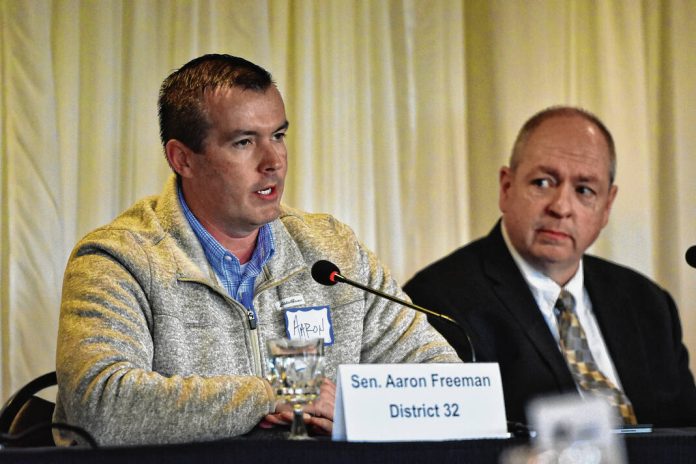A state senator known for filing legislation aimed at IndyGo has introduced a measure targeting the transit agency again in 2024. IndyGo says the bill, if passed, would kill the proposed Blue Line. He also plans a bill that would reverse Indianapolis’ new no-turn-on-red ordinance.
Sen. Aaron Freeman, R-Indianapolis, has filed Senate Bill 52, which would prohibit public transportation projects from using dedicated lanes. It would specifically target the planned Blue Line rapid-transit bus route, which would run east to west across the city along Washington Street.
The law would not apply to dedicated lanes that have completed construction before March 31, 2024. IndyGo’s Red Line already has dedicated lanes while IndyGo is slated to soon complete the Purple Line, which runs from downtown Indianapolis to Lawrence and utilizes dedicated lanes.
Construction on the Blue Line is slated to begin in 2025 and wrap up by 2027. The project carries an estimated construction price tag of about $370 million.
Freeman told IBJ he’s not against public transit, but against the dedicated lanes, which he said will slow traffic on a major city thoroughfare.
“I’m a lawyer. I’m not an engineer, and I don’t do traffic studies for a living,” Freeman told IBJ. “But every normal human sense of my being says that when you take Washington Street, which is two lanes each direction with a turn lane in the middle, and you … turn [the route] from Hancock County to Hendricks County into a single-lane road, pardon me, but that’s astronomically dumb.”
Freeman, a former Indianapolis City-County Council member, has introduced legislation targeting IndyGo on at least two other occasions. This time, though, he thinks the political will exists to pass the bill in both the Senate and the House—where previous efforts have died.
“This is the year to do it,” Freeman said, because IndyGo has proved it is “unwilling to have this fight” and “will not change direction” to “pursue shared lanes.”
Freeman said he has met with Speaker Todd Huston, R-Fishers, on the topic and about 15 business owners and business-interested residents along the planned Blue Line route.
“They’re not anti-transit, they’re not anti any of this. They are anti-dedicated lanes, as I am. And so my hope is that, you know, for first time this year we’re going to eliminate their ability to do dedicated lanes,” Freeman told IBJ.
Rep. Julie McGuire, a fellow Marion County Republican, is expected to author a companion bill in the House, Freeman said. McGuire did not respond to a request for comment in time for publication.
IndyGo spokesperson Carrie Black said in an emailed statement that the removal of dedicated lanes would jeopardize federal funding for the Blue Line and kill the project.
“Without dedicated lanes, the Blue Line does not move forward and would mean the devastating loss of millions of dollars in traffic calming and safety features, along with significant drainage and infrastructure improvements, including sidewalks, street paving, and ADA curb ramps along Washington Street that otherwise would not be realized along a corridor that desperately needs it,” Black wrote in an email.
The dedicated lanes will improve bus travel times and reliability, reduce the impact of congestion or traffic incidents, and improve safety for all modes of transportation by calming traffic, Black wrote.
She also referred to the 2016 transit referendum in which 60% of voters approved the bus rapid transit lines.
Freeman said IndyGo hasn’t honored the commitments it made prior to the 2016 referendum, such as the requirement that 10% of its operating costs be be paid from funding sources other than taxes and fares. But IndyGo has interpreted that amount to include state and federal funding, while Freeman and other critics believe IndyGo should be raising those funds privately through its foundation.
In 2023, IndyGo’s operating budget used nearly $90 million in fares and taxes and just $40 million in state and federal grants and stimulus funds—a formula by IndyGo’s definition that exceeds the requirement from the state law that allowed the referendum.
IndyGo is currently searching for a new leader following CEO Inez Evans departure this month. Jennifer Pyrz, chief development officer for IndyGo, is serving as interim CEO.
Reversal of Indianapolis’ no-turn-on-red ordinance
Aside from just IndyGo, Freeman has generally become known for legislation that targets measures created by Democrats in Indianapolis.
This past session, Freeman passed a bill into state law that would prohibit the city from creating a no-turn-on-red ordinance across all of downtown.
Because the law did not go into effect immediately at the time of passage, the legislation allowed the City-County-Council’s Democrat majority to pass its ordinance anyway. The ordinance includes a clause allowing Department of Public Works engineers to determine when an intersection should have no-turn-on-red signs installed, to skirt the law prohibiting the council from making such decisions.
Freeman told IBJ he has already filed a bill targeting Indianapolis’ no-turn-on-red ordinance. The final draft of the legislation provided to IBJ would apply Freeman’s earlier law retroactively, starting at the beginning of 2023. It intends to void Indianapolis’ ordinance and, if passed, would require the removal of numerous no-turn-on-red signs established under the ordinance.
Council Vice President and ordinance sponsor Zach Adamson told IBJ in a recent interview that there are always going to be lawmakers “who feel that it’s important to micromanage the affairs of the state capital” but that the council has “adjusted to that reality.”
He hopes that other lawmakers are tiring of Marion County-focused state legislation.
“I don’t anticipate that many of the individuals who are, you know, really gung-ho about involving themselves in the day-to-day affairs of Indianapolis are going to go anywhere, but I also think that other members of the Legislature are really, really tired of the constant attention that certain legislators have to fixate on the city of Indianapolis,” Adamson said.
By Taylor Wooten, Indianapolis Business Journal





